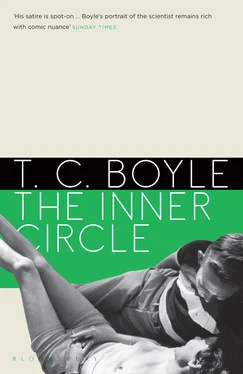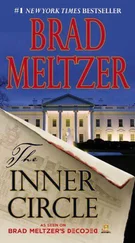Iris was in bed, asleep, curled round the prow of her hip and the sharp terminus of her folded knees; John Jr. stood silently in the playpen at the foot of the bed, clutching the bars and staring at me as if I were a visitation out of the universal unconscious. He had Iris’s eyes exactly. “Hey, champ,” I said, and I squatted down to poke my face in his, “Daddy’s home.”
My son gave me a smile of sudden stunned recognition, followed by a gurgle of infantile transport, baby joy naked and unfeigned, and I took him under the arms and swung him out of the playpen even as the fecal odor swamped the room: he needed to be changed, had needed to be changed for some time. “Yes,” I cooed, “that’s the boy,” and set him back on his feet behind the wooden slats of his gaudy prison. At which point, he began to wail.
“What?” Iris pushed herself up, struggling to focus. There were two parallel indentations on her cheek where her face had creased the pillow, red stripes that might have been wounds. She was in her nightgown still, though it was nearly noon. “John? Oh, God, you scared me.”
“Yeah,” I said, “I scare myself sometimes too.” I made no move toward her. John Jr. began to outdo himself, each shriek building on its predecessor like waves crashing in a storm.
“Here,” she said, holding out her arms, “give him here.”
I lifted the squalling bundle of him from the playpen, careful to avoid the wet spot at the crotch of his playsuit. Playpen, playsuit, playmate, playtime: more euphemisms. “He needs to be changed,” I said.
I watched her fussing over him, the shrieks subsiding into disconnected wails that were like the sound of shingles falling off a roof. The walls closed in on me. Everything was a mess, everything stank. “What,” I said, “are you sick?”
No, she wasn’t sick, she wasn’t sick at all. She’d never felt better — physically, that is.
So what was the problem?
She was depressed.
“ You’re depressed?” I loomed over the bed. Her face was small, a nugget, sidelong and averted. “What about me? I’m the one who had to sit in some rancid overheated room for ten days and watch a thousand men jerk off. You think that’s fun? You think I like it?”
A silence. The tragic underlip. “Yes, John,” she said finally, her eyes fixed on mine, “I think you do. You do it with Prok, don’t you? And Purvis? And half the tramps and male hustlers in, in — go ahead, hit me. Will that make you feel like a big man, huh, will it?”
I didn’t hit her. I’ve never hit her and never will. And when I spoke earlier in pugilistic terms, of bouts and rounds, you have to understand that it was meant metaphorically, strictly metaphorically. Certainly we had our disagreements, like anyone else, but violence had no place in them, at least not physical violence. I just turned my back on her and stalked out the door. I might have kicked something against the wall in the living room, a teddy bear or a toy dump truck, I don’t remember, and then I went out in the yard to have a smoke and let the dead gray November sky feed my mood.
Later, when we’d both cooled off, she got up and dressed and changed the baby. She made a real effort to tidy up the place — it just wasn’t in her nature to let the housekeeping go, at least not for long — and she went out of her way to make a nice meal that night. I’d gone in to the Institute to put in half a day, and when I got back I must have dozed off, because I remember waking to the smell of something in the oven, and then Iris padded into the room — the living room; I was on the couch — and deposited a bathed and talcum-scented toddler in my lap, along with a glass of beer.
I played with John Jr. a moment, and then he got down and staggered off across the room to rummage among his dump trucks and steam shovels. “Listen, Iris,” I said, lifting my eyes to hers, “I’m sorry about this morning. I didn’t mean — I was tired, that’s all.”
Iris had her own glass of beer. She was wearing a gingham house-dress, blue and white, and her hair was up. “You were in a pretty foul mood,” she said.
“Yeah,” I said. “I’m sorry.” I was thinking of the calculus of a relationship, how sex equals love equals babies, mortgages and cellar doors left ajar, and how love itself is nothing more than a hormonal function, purely chemical, like rage and hate. But I had a beer in my hand and a roof over my head, and my son was there, and my wife, and what more could anyone want? Other wives, other sons, other roofs? I felt charitable. Felt content. “But, hey,” I suggested, “how about if I build a fire? Would you like that?”
“Sure, that would be nice.” She was propped on the arm of the chair, one leg dangling, her pretty leg, her ankle, her foot in its trim felt slipper. “But, John, there’s something I wanted to say to you — and don’t give me that look because it’s nothing like that. It’s — well, I want you to teach me how to drive. Violet and Hilda drive everywhere — Violet says she’d be lost without her car — and even Mac, Mac drives, and if you’re going to be gone all the time—”
“I’m not, I’m not gone all the time — and I’m not going to be.”
“—leaving me alone way out here for how long? Weeks at a time?”
“Ten days.”
“Okay, ten days. But I’m stuck here. What if the baby needs something? What if I run out of flour — which I did — or, I don’t know, what if I just feel bored? Don’t you know I get bored out here — don’t you realize that?”
“You’re the one who wanted the place.”
“You wanted it too.”
I stared into the black pit of the hearth. Cold ash there, the butt ends of charred sticks poking through like bones at the crematorium. Across the room, John Jr. was talking to his toy trucks. “Bad boy,” he was saying, over and over, “bad!” The ice cream was in the freezer, the pistachios still in the bag on the counter. I looked up at my wife. “When do you want your first lesson?”
If I was reluctant at first — forced into something I had neither the time nor the patience for — it took only one lesson for me to realize my mistake. I can’t speak for Iris, but for me the next few weeks were some of the best times we’d ever had, John Jr. in my lap, Iris at my side, focused and intent, her hands locked on the wheel even as she negotiated the perdurable mysteries of clutch and accelerator. We memorized the back roads, watched the hills roll at us, one after another, like waves on a concrete sea, and we went where the mood took us, stopping for a milkshake or a hot dog or just to wander up a streambed and share a sandwich on a fallen log. Then it was back in the car, the clutch, the accelerator, jerk forward and stall, grind the ignition, the clutch, the accelerator, jerk forward and stall again. I don’t know what it was, something to do with her fragility, I suppose, with her very narrow and specific need and my ability to direct it—“Turn left,” I would say, “stop here; third gear; put it in reverse”—but I cherished that time. I never lost my temper, never raised my voice, not even when she swerved off the road to avoid a hell-bent squirrel and put three long gouges in the right front fender.
Indulge me a moment, because this is important — not to Prok, maybe, but to me. It was the day after Thanksgiving, the sun stripped of color, Iris gaining in confidence, the wheels firm on the road and my attention drifting into another realm altogether, when suddenly the squirrel made his dash across the pavement and my free hand got to the wheel an instant too late. There was the shock of the impact, a screech of stone on metal, and then the car stalled. Startled, John Jr. began to pipe and then the piping grew in fullness and volume till he was bawling at the top of his lungs though there wasn’t a mark on him — on any of us. She hadn’t been going more than twenty miles an hour.
Читать дальше












